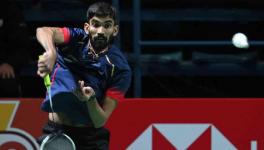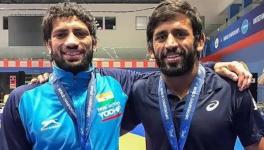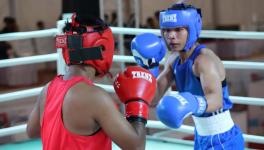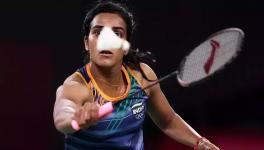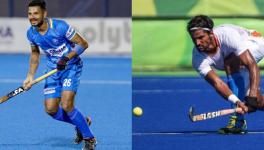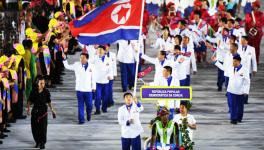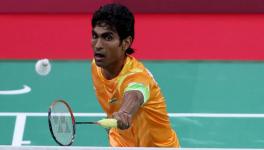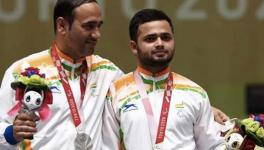Transgender Weightlifter Laurel Hubbard Makes History at Tokyo Olympics
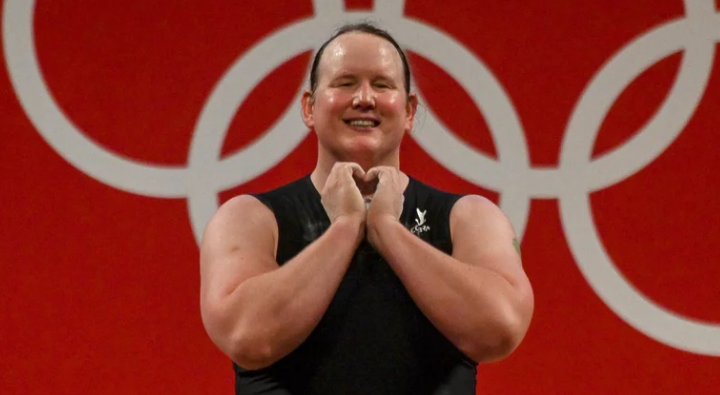
Laurel Hubbard acknowledges the applause from the crowd during her weightlifting competition at the Tokyo Olympics (Pic: NPR.org, Twitter).
It lasted only a few minutes, ending in almost an anticlimax, we could say. Then again, the journey of transgender weightlifter Laurel Hubbard is not ending at the Tokyo Olympics. Not for her, not for many others who would be inspired by, and follow the pioneer.
Hubbard’s outing at the Tokyo Olympics is significant beyond the medals or the time she spent on the lifting platform. Hubbard couldn’t complete any of her first three lifts on Monday night, which ruled her out of medal contention in the women’s plus 87 kg division. The gold in the category went to China’s Li Wenwen.
Click | For More Coverage of the Tokyo Olympics From Newsclick Sports
However, even without completing a lift, Hubbard is a pioneer for transgender athletes.
While the New Zealander isn’t the only transgender athlete competing at the Tokyo Games, she has been out for years and has been the focus of attention as a medal contender in weightlifting.
“Of course, I’m not entirely unaware of the controversy which surrounds my participation in these Games,” Hubbard was quoted by AP. “And, as such, I’d particularly like to thank the IOC, for, I think, really affirming their commitment to the principles of Olympism, and establishing that sport is something for all people. It is inclusive. It is accessible.”
Also Read | Tokyo Olympics: India Go Down to Belgium in Men’s Hockey Semifinal
Hubbard also thanked the International Weightlifting Federation for the support.
“They too have shown that weightlifting is an activity that’s open to all of the people in the world.”
The International Olympic Committee (IOC) drew up a set of recommendations for including transgender athletes at the Games.
In weightlifting, the rules stipulate athletes to show their testosterone levels are below a certain level after transitioning, a requirement which Hubbard met. She won a silver medal at the 2017 world championships but had not competed for 1 1/2 years before Tokyo because the coronavirus pandemic hit the competition schedule.
The insistence on testosterone levels is something that has been debated in the scientific community. The IOC will release a new “framework” for transgender athletes’ eligibility in the coming months, which is expected to take into account newer scientific studies published since the last major review in 2015. That will form a basis for sports to draw up their own updated policies.
Also Read | Lightning and the Backhand Swish: An Ode to Tai Tzu-ying and Yufei Chen
That could open up opportunities for many more transgender athletes to take part in sports at the highest level.
On the competition front, Hubbard overbalanced on her opening snatch weight of 120 kilograms, dropping the bar behind her shoulders.
Her second effort of 125 kilograms — a weight Hubbard has often managed in previous competitions — was ruled as foul by all three referees. With New Zealand teammates and staff calling out encouragement, the third attempt was almost a repeat of the first.
Li’s victory gave China its seventh gold medal in weightlifting at the Tokyo Games. Her rivals never got close to the 320-kilogram winning total, with Emily Campbell of Britain finishing 37 kilograms behind to take silver. Sarah Robles of the United States repeated her bronze from 2016 with 282, becoming the first US woman with two weightlifting medals.
(With additions from PTI/AP)
Get the latest reports & analysis with people's perspective on Protests, movements & deep analytical videos, discussions of the current affairs in your Telegram app. Subscribe to NewsClick's Telegram channel & get Real-Time updates on stories, as they get published on our website.










